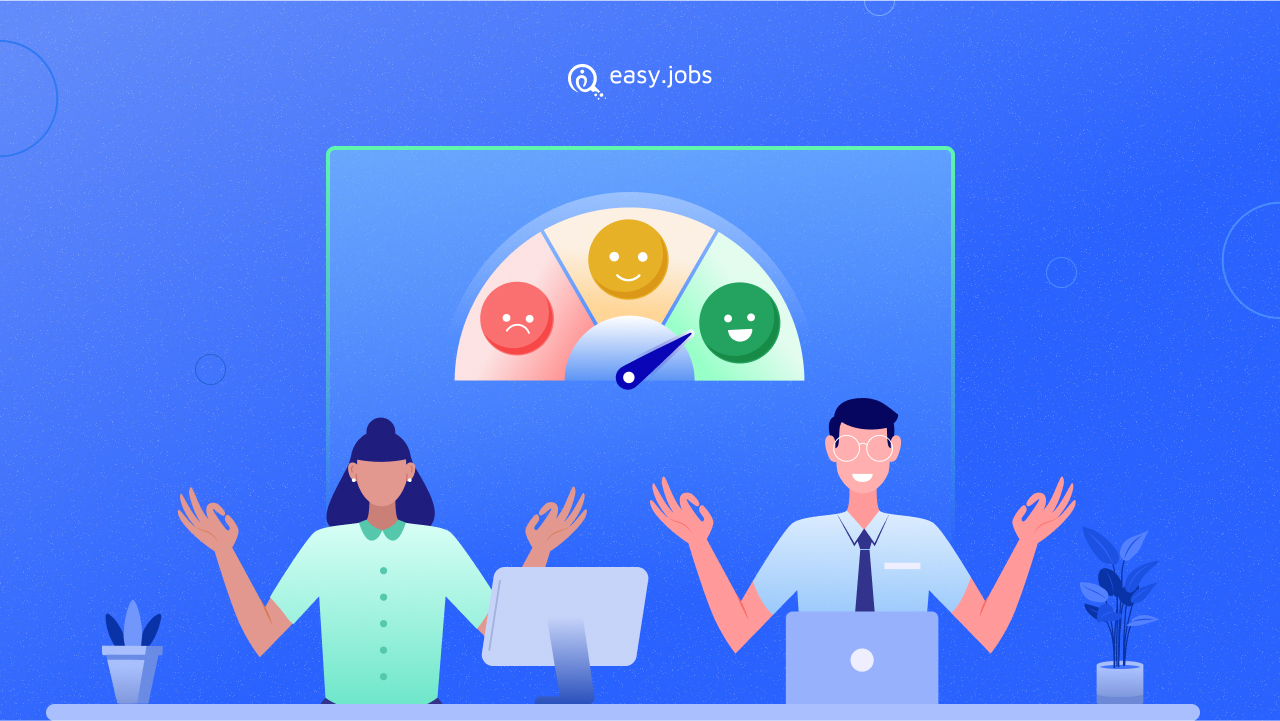Mental health at work is no longer just a personal matter but has become a business priority. HR professionals are playing a leading role in promoting employee well-being, creating supportive environments, and reducing burnout. Employees who feel valued and supported are more productive, engaged and loyal. Let us learn how to build a healthier, more resilient workforce by prioritizing mental health in the workplace.

Why Mental Health at Work Matters
Mental health at work is about creating a supportive environment where employees can prosper. When businesses prioritize mental health, they benefit from higher productivity, lower turnover and stronger employee morale. Let us see the key reasons to prioritize mental health:
- Improved Well-being: Supported employees are happier, more engaged and more productive.
- Reduced Absenteeism: A positive work environment leads to fewer sick days and lower healthcare costs.
- Better Team Dynamics: Open communication and support foster collaboration and trust.
- Stronger Retention: Employees stay longer when they feel valued and supported.
However, when organizations overlook the signs of burnout and chronic stress, even the most supportive environments can struggle to retain top talent. Understanding and handling these risks is crucial for sustaining a healthy, productive workforce.
The Cost of Ignoring Employee Burnout
Burnout is a deep state of physical, emotional and mental exhaustion caused by long-term stress. It can lower job satisfaction, increase healthcare costs and reduce organizational loyalty. Ignoring burnout does not just affect individuals. It can harm the entire team’s performance and morale.
How Work-Related Stress Affects Productivity
Work-related stress is one of the top causes of mental health issues in the workplace. High workloads, tight deadlines and poor management support can lead to chronic stress, affecting focus, decision-making and creativity. This, in turn, reduces productivity and job satisfaction, increasing the likelihood of turnover.
The Long-Term Benefits of Prioritizing Mental Health at Work
Organizations that invest in mental health at work reduce costs related to absenteeism and turnover and build a more engaged, resilient workforce. Prioritizing mental health can improve employee morale, foster a positive workplace culture and enhance overall business outcomes.
The HR Role in Supporting Mental Health at Work

HR professionals play a crucial role in creating a mentally healthy workplace. Their responsibilities extend beyond managing talent and benefits. They are the frontline champions for fostering a culture of psychological safety, inclusion and well-being.
Steps HR Can Take to Support Mental Health in the Workplace
The well-being of employees starts with understanding their diverse challenges and providing appropriate support to address these needs. Below are the steps you can take as an HR professional.
1. Regular Check-Ins And Open Communication

Establish frequent one-on-one meetings, team huddles and anonymous feedback channels to ensure employees feel heard and valued.
2. Flexible Work Policies

Implement flexible work arrangements, remote work options and mental health days to help employees balance their personal and professional lives.
3. Training And Awareness Programs

Offer mental health training for managers to identify early signs of burnout, stress, or emotional distress and to respond with empathy and support.
4. Confidential Support Resources

Providing access to Employee Assistance Programs (EAPs), mental health hotlines, and counseling services that employees can use without fear of judgment or repercussion.
5. Mental Health First Aid

Training HR personnel and managers in mental health first aid to provide immediate support in crises while guiding employees toward professional help.
To effectively support these initiatives, it is essential to have clear, structured mental health policies in the workplace. Ensuring employees have access to the right resources and feel secure in seeking help.
Developing Mental Health Policies for Employees
Clear, supportive mental health policies are essential for a healthy workplace. These policies should go beyond compliance and reflect the organization’s commitment to employee well-being. Effective policies might include:
- Comprehensive stress management plans.
- Clearly defined mental health days are separate from regular sick leave.
- Flexible work arrangements that acknowledge diverse work styles and personal needs.
- Anti-bullying and anti-harassment policies to prevent toxic work environments.
- Clear communication protocols to ensure employees are aware of available support without stigma.
However, even the best policies can only make a difference in a supportive work environment. Creating a culture where employees feel safe to discuss challenges without fear of judgment is the next critical step in building a mentally healthy workplace.
Building A Supportive Work Environment
Creating a positive work environment is about building a culture where employees feel safe to discuss challenges without fear of retaliation or judgment. HR can promote this by:
- Organizing wellness programs like mindfulness sessions, fitness challenges and mental health awareness events.
- Providing access to digital mental health platforms and resources, such as apps for meditation or therapy.
- Encouraging a stigma-free atmosphere where seeking help is normalized and celebrated.
- Creating peer support networks and mentorship programs to foster community and connection.
- Regularly measuring and adjusting workplace culture through surveys and feedback ensures the environment remains supportive.
Ultimately, HR’s commitment to mental health can transform workplaces into more supportive, productive and resilient communities where employees feel valued and empowered.
Training & Education for Leaders And Managers
Leaders and managers are the frontline of workplace mental health. They can set the tone for a supportive, healthy work environment. Providing mental health training for leadership helps them recognize the early signs of stress, burnout and other mental health issues among their teams.
It also equips them with the skills to have open, compassionate conversations with employees. Let us take a look at the key Components of Effective Mental Health Training for Leaders:
- Active Listening Skills: Teaching leaders to truly listen without judgment, offering their full attention and understanding during conversations.
- Emotional Intelligence (EQ): Developing the ability to understand and manage both their own emotions and those of their team members, enhancing empathy and communication.
- Conflict Resolution: Providing tools to address and resolve workplace conflicts before they escalate into more significant issues.
- Stress Management for Leaders: Equipping managers with personal stress management techniques so they can lead by example.
- Work-Life Balance Education: Encouraging leaders to support flexible work arrangements and healthy work-life boundaries to reduce burnout and promote well-being.
By empowering leaders with the proper knowledge and tools, HR can create a ripple effect that transforms the entire organization, making mental health a core part of the company culture.
Monitor And Improve Mental Health Initiatives
Creating mental health policies is only the beginning. Ongoing monitoring and improvement are crucial for sustaining their impact. HR professionals should regularly assess the effectiveness of these initiatives, using data to refine and adapt programs as needed.
Collect Employee Feedback

Gathering regular feedback from employees is a critical first step in understanding their mental health needs and the effectiveness of existing support programs. This can be done through a variety of methods, including:
- Surveys and Pulse Checks: Regular, anonymous surveys provide insight into employee satisfaction and mental health needs.
- Focus Groups: Small group discussions allow HR to gather detailed, qualitative feedback on specific challenges and opportunities for improvement.
- One-on-One Conversations: Personalized feedback sessions help HR understand individual employee concerns and build trust.
To truly measure the effectiveness of mental health initiatives, it is essential to go beyond just collecting feedback. Tracking key metrics provides a data-driven approach to understanding the real impact of these programs and identifying areas for continuous improvement.
Track Key Metrics

To assess the effectiveness of mental health programs, HR professionals must track key performance metrics in recruitment and the workplace that reflect the overall well-being of their workforce. These metrics provide valuable insights into the impact of mental health initiatives and highlight areas for improvement:
- Absenteeism Rates: High absence levels can indicate rising stress and burnout issues.
- Employee Retention: Turnover rates can reflect the effectiveness of mental health support programs.
- Employee Satisfaction Scores: Regularly measuring morale and engagement to identify improvement areas.
However, tracking metrics is just one part of the equation. Organizations must be prepared to adapt their programs to maintain a mentally healthy workplace as employee needs evolve and workplace dynamics shift. This flexibility ensures that support remains relevant and impactful.
Adapt Programs to Meet Evolving Needs

Organizations must be agile in their approach to keep mental health initiatives effective and relevant. As workplace dynamics and employee expectations shift, HR should focus on continuously evolving its support strategies to address emerging challenges:
- Regularly update training programs and resources to address emerging challenges.
- Offer diverse support options, including digital tools and flexible work arrangements.
- Foster a continuous feedback culture to keep mental health at the forefront of workplace priorities.
- Maintain a stronger company reputation because companies known for their mental health commitment attract top talent when hiring and build stronger employer brands.
By continuously monitoring and improving mental health initiatives, HR can create a more supportive, productive and engaged workplace where every employee feels valued and empowered.
Build A Resilient Workplace Through Mental Health Leadership
Investing in employee mental health is an excellent initiative for sustainable success. It boosts loyalty, enhances productivity and fosters a supportive culture, creating a stronger, more resilient organization with a positive reputation.
HR professionals play a central role in shaping workplace culture. Promoting open communication, providing meaningful support and creating policies prioritizing mental health help build environments where employees feel secure, valued, and empowered. This commitment benefits individual employees and drives broader organizational success, creating workplaces where both people and businesses thrive.
Stay informed with the latest insights on mental health, leadership, and employee well-being to keep building a more resilient, supportive workplace. Subscribe to our blog for regular updates, and join our Facebook community to connect with like-minded professionals committed to creating thriving workplaces.






